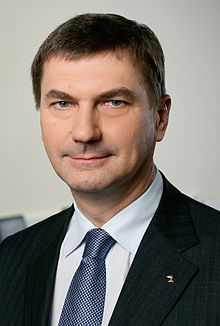Andrus Ansip | |
|---|---|
 Ansip in 2012 | |
| Member of the European Parliament for Estonia | |
| Assumed office 2 July 2019 | |
| European Commissioner for Digital Single Market | |
| In office 1 November 2014 – 1 July 2019 | |
| President | Jean-Claude Juncker |
| Preceded by | Neelie Kroes (Digital Agenda) |
| Succeeded by | Maroš Šefčovič (Acting) |
| European Commissioner for Digital Economy and Society Acting | |
| In office 1 January 2017 – 7 July 2017 | |
| President | Jean-Claude Juncker |
| Preceded by | Günther Oettinger |
| Succeeded by | Mariya Gabriel |
| 16th Prime Minister of Estonia | |
| In office 12 April 2005 – 26 March 2014 | |
| President | Arnold Rüütel Toomas Hendrik Ilves |
| Preceded by | Juhan Parts |
| Succeeded by | Taavi Rõivas |
| Minister of Economic Affairs and Communications | |
| In office 23 September 2004 – 12 April 2005 | |
| Prime Minister | Juhan Parts |
| Preceded by | Meelis Atonen |
| Succeeded by | Edgar Savisaar |
| Mayor of Tartu | |
| In office 10 September 1998 – 23 September 2004 | |
| Preceded by | Roman Mugur |
| Succeeded by | Laine Randjärv |
| Personal details | |
| Born | 1 October 1956 Tartu, Estonia |
| Political party | Reform Party |
| Spouse | Anu Ansip |
| Children | 3 |
| Alma mater | University of Tartu Estonian University of Life Sciences |
| Signature | |
Andrus Ansip (Estonian pronunciation: [ˈɑnːtrus ˈɑnʲːsʲipː]; born 1 October 1956) is an Estonian politician, a member of the European Parliament, the former European Commissioner for Digital Single Market and Vice President of the European Commission, in office from 2014 until 2019. Previously, he was Prime Minister of Estonia from 2005 to 2014 and chairman of the liberal Estonian Reform Party (Estonian: Reformierakond) from 2004 to 2014.
Before his entry into politics Ansip trained as a chemist, before working in banking and business. He entered Parliament in 2004, quickly becoming Minister of Economic Affairs, and subsequently prime minister in April 2005. On 1 November 2014, he was appointed to the European Commission.